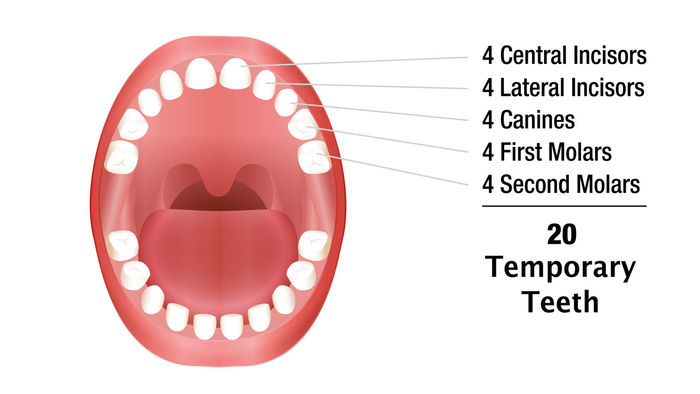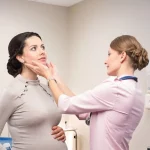Babies are usually born with 20 baby teeth (also known as primary teeth). They start to come through the gums at about 6 months of age. This process is called teething.
By the time your baby is 2 to 3 years old, all their teeth will usually have appeared.
About baby teeth
Babies are born with the following teeth:
- 4 second molars
- 4 first molars
- 4 canine teeth
- 4 lateral incisors
- 4 central incisors
There is one set on each side of the upper jaw, and one set on each side of the lower jaw.

Your child’s jaw will continue to grow as they do.
When your child is about 6 years old, their adult teeth will start to replace their baby teeth. Adult teeth are also known as permanent teeth.
Baby teeth are different from adult teeth in a couple ways. The outer covering of baby teeth is made of thinner enamel than the enamel of adult teeth. This makes the baby teeth look whiter.
Baby teeth also have narrower, different shaped roots to adult teeth. This allows space for adult teeth to grow underneath them.
What is teething?
When your baby’s teeth start to come through, this is called teething.
The teeth in the centre of the bottom jaw often come through first, sometime between 6 months and 10 months of age. Your child should have at least one tooth by the time they turn one.
Your child should have all baby teeth by the time they are 3 years old. Every child is different. Don’t worry if your baby’s teeth appear earlier or later. Talk to your dentist if you are worried.
Why are baby teeth are important?
Baby teeth are important, as they:
- help your child to chew food easily
- help your child pronounce (say) words properly
- keep a place in their jaw for their permanent teeth
It is important to keep baby teeth clean. This will protect against:
- infection
- cavities (holes caused by decay)
- pain
Serious injury to baby teeth can damage the permanent teeth underneath.
How to care for baby teeth
Baby teeth can start to decay as soon as they appear in the mouth.
You should wipe your baby’s gums with a wet facecloth or a clean gauze pad after each feed. You can brush your baby’s first tooth as soon as it appears. To do this, use a soft toothbrush and a little water.
Older children should be supervised while they are cleaning their teeth. Children over 18 months can use a pea-sized amount of children’s low-fluoride toothpaste. Try to teach them to not swallow it. They should rinse with water after brushing.
Your child’s diet
If your child has a lot of sugar, this can destroy their teeth.
To reduce the risk of tooth decay, the best drinks for your baby besides breastmilk are milk and water. However, remember that babies under 12 months old should only have breastmilk or infant formula.
Do not bottle feed with cordial or juice. Before bed, you should only bottle feed with water.
As your child grows, limit their intake of sugary foods such as:
- lollies
- cakes
- cereals
- flavoured yoghurt
Be sure to keep their dummy or pacifier clean, and don’t dip it in honey.
Be sure to supervise younger children when they‘re learning to walk. This is because they can injure their teeth by bumping into things.
Visiting the dentist
You should take your child for their first dentist appointment when their first teeth appear, or by their first birthday.
Dentists can give you and your child tips on how to keep their teeth and gums healthy. They can also advise you on what to expect as your child’s mouth develops.



